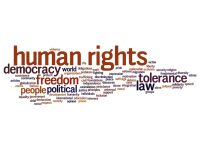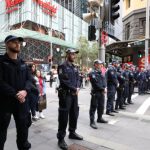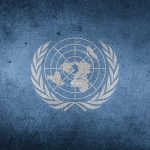Democracy Is in Tatters Across the Globe

Democracy suffered “its most crucial crisis in decades” last year, according to a leading annual report on global freedom. And this continued a twelve year trend, which has seen a gradual decline in fair elections, minority rights, press freedoms and the rule of law around the world.
Released earlier this year, the Freedom in the World 2018 report outlines that 2017 saw the erosion of political rights and civil liberties in 71 countries, whilst citizens in only 35 nations benefited from gains in personal freedoms.
The report warns that there’s been a general increase in antidemocratic practices globally, which has been characterised by a rise in populist leaders appealing to anti-immigration sentiments, whilst leading autocracies Russia and China have been consolidating their power.
Looking back over the events of last year, the report categorised 87 countries as free nations, 59 were said to be partially free and 49 were deemed not free. Nations where political rights and civil liberties were found to be almost non-existent included Syria, South Sudan, Eritrea and North Korea.
The age of Trump
Freedom House has been producing the annual Freedom in the World report since 1973. The US-based NGO has been criticised in the past for being biased towards US interests, as it’s funded by the United States government.
However, in its latest report, Freedom House president Michael J Abramowitz gives a scathing account of the democratic performance of his nation under the Trump administration, which he notes has seen an “accelerating” erosion of basic freedoms.
The report found that Donald Trump has shown a blatant disregard for the democratic values that his nation’s foreign policy has previously been based upon. And under his watch, there’s been a reorientation towards an isolationist approach to international affairs.
On the domestic side, Trump has been leading an attack on the nation’s institutions. He’s criticised members of the judiciary and heads of law enforcement and intelligence agencies. And he’s also accused the media of reporting fake news, whilst making countless false statements of his own.
Fascist sympathies
And whilst Trump has failed to push democratic values in the speeches he’s given abroad, he’s managed to heap praise upon some of the most tyrannical world leaders, including Russia’s Vladimir Putin, China’s Xi Jinping and the Philippines’ Rodrigo Duterte.
Abramowitz explains that this is a dramatic break from the stance of previous US presidents who might have cooperated with authoritarian regimes for political purposes, but also maintained their commitment to democracy both at the domestic and international levels.
The author states that under Trump the United States has retreated from its traditional role as a champion of democracy. Although, the idea of the US being a bastion of democracy has been rather flimsy since the its government engineered an antidemocratic coup in Guatemala in 1954.
The rise of the European right
Populist parties with xenophobic tendencies gained traction in Europe last year. This follows on a trend, which has seen the Fidesz party holding office in Hungary since 2010 and the Law and Order party being the majority in government in Poland since 2015.
In France last year, Marie Le Pen rose to prominence as a popular presidential candidate promising to suspend immigration and hold a referendum on her nation’s EU membership. However, she was subsequently defeated by now French president Emmanuel Macron.
And for the first time since the fall of the Nazis, a far-right party was voted into the German parliament. The anti-immigration Alternative for Germany won a third of the votes in the national election with a campaign pledge of deporting refugees.
The anti-Muslim Freedom Party came in third in the Austrian election and is now part of the governing coalition. And Norway’s far-right Progress Party received 15 percent of the vote and is currently part of that nation’s coalition government.
The Rohingya crisis
The report also notes the failure of the fledgling democracy in Myanmar. The National League for Democracy party won that country’s first free elections in 25 years in November 2015. However, the military still maintain key government positions.
In August last year, in response to an attack by a small armed faction, the Myanmar military launched a violent crackdown on the mostly Muslim Rohingya minority in the country’s western state of Rakhine. And this was the second major assault on the population in less than a year.
Since the crackdown began, thousands of people have died and over 700,000 Rohingya have fled into neighbouring Bangladesh. These people are now forced to stay in monsoon threatened refugee camps in Cox’s Bazaar, while discussions over a repatriation process have stalled.
Aung San Suu Kyi is Myanmar’s state counsellor, which is the de facto head of state. A UN report released last Monday has condemned the Noble Peace Prize winner for doing nothing to prevent the violence and acting as a spokesperson for the Myanmar military.
The gradual erosion in Australia
The Freedom House report rated Finland, Norway and Sweden as the nation’s where citizens are afforded the greatest freedoms. This was followed by Canada and the Netherlands. And then Australia came in next, alongside New Zealand, Luxemburg and Uruguay.
But, while Australia rates highly in the estimation of the report, it must be remembered that last year saw some developments that reveal that Australian civil liberties are under threat and need to be protected.
In August last year, Malcolm Turnbull announced that the government would be creating new laws that will allow law enforcement agencies to access citizens’ personal information on devices such as smartphones. And the draft of the bill that will enact those laws was released a few weeks ago.
While in October, the Coalition government announced a national facial recognition system that will allow for the real-time matching of images taken from CCTV footage with all Australian citizens’ identification photos that are stored in various databases around the country.
As human rights lawyer Julian Burnside warned Sydney Criminal Lawyers® back in June the federal government is on a path of making “small incremental erosions” of Australians’ rights. And without a national bill of rights to protect personal freedoms the government can simply carry on.







